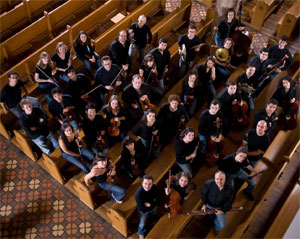by Daniel Hathaway
CityMusic Cleveland’s
The crowd on Wednesday evening came out to hear an overture and a concerto by Mozart and a symphony by Mendelssohn, with a holiday add-on of spirituals and “Holiday Songs” sung by the Mount Zion Choir. The excellent soloist was principal oboist Rebecca Schweigert Mayhew. Guest conductor for the evening was Stefan Willich, whose day job is Professor of Medicine in Berlin, but who moonlights as conductor of the World Doctors Orchestra, an ensemble of a hundred physicians from twenty countries who gather twice a year to play benefit concerts — the ensemble made its U.S. debut in Severance Hall in February, 2009.
Though a core of players remains the same, there is some variety in CityMusic’s personnel from one concert set to another, and the orchestra plays in a wide range of acoustical settings from the not-so-live sanctuary of Fairmount Church to the basilica-like vastness of St. Colman’s. Adjusting to all those differences (including some radical weather changes early this week) necessarily affects the way the group sounds from set to set and night to night, but it’s a tribute to the training and adaptability of the players that CityMusic always manages to produce fine results whenever and wherever they play.
Willich set an appropriately lively tempo for Mozart’s Marriage of Figaro Overture, which worked well at Fairmount. The strings (violins and violas standing) skittered cheerfully through their scale passages and the winds topped off the ensemble with well-tuned chords.
Rebecca Schweigert Mayhew brought digital fluency and a full but buoyant tone to Mozart’s long-lost oboe concerto (it had been hiding as a flute concerto until unmasked in 1920), producing high notes that sounded wonderfully pure and true. Her stylish cadenzas were by one of her teachers, the late great John Mack, and Mayhew and Willich teamed up to create fine transitions between what Mozart and Mack each contributed to the occasion. The orchestra responded beautifully to Mayhew’s phrasing and allowed her to sing through the ensemble with an elegant presence.
It would made great programatic sense to continue on to Mendelssohn’s Italian Symphony, but here the evening was interrupted after only half an hour of music by a 35-minute intermission (and reception in an adjoining room), a pause that seemed to rob the second half of the concert of some of the energy Mozart had stirred up in the first.
Mendelssohn’s fourth symphony (for which the upper strings sat down) almost plays itself once good tempos are established and when the musicians are up to its technical demands as was the case on Wednesday evening. Willich’s were sensible except for the final Saltarello, which pressed the winds to superhuman feats of fast tonguing, but his concept of individual movements sometimes seemed a bit at odds with their natural character. By the end of the run, some opening night ensemble problems between strings and winds will surely take care of themselves. It was refreshing to hear the timpanist use hard sticks that gave an arresting punch to his musical punctuation.
The evening ended with something completely different: Christmas arrangements by Roland Carter, Kirk Franklin and Quincy Jones and original gospel songs by Franklin and Richard Smallwood sung by the Mount Zion Choir. Bringing a local church choir together with the chamber orchestra charmingly underlined CityMusic’s commitment to community engagement.
Published on ClevelandClassical.com December 18, 2012
Click here for a printable version of this article.


